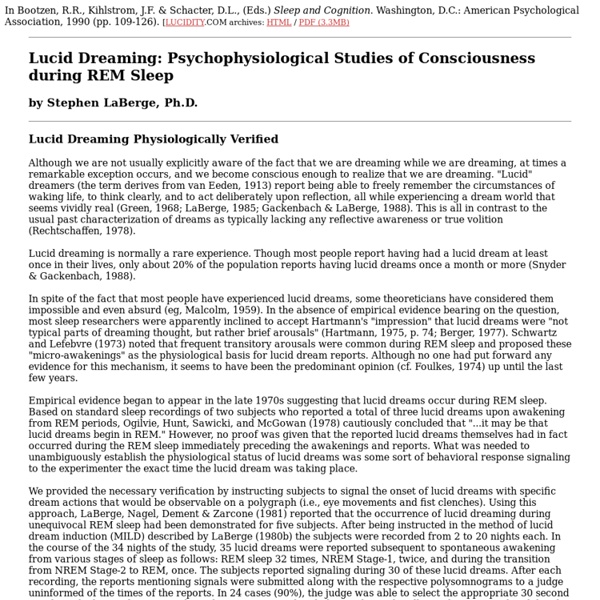Psychophysiology of Lucid Dreaming
by Stephen LaBerge, Ph.D. Lucid Dreaming Physiologically Verified Although we are not usually explicitly aware of the fact that we are dreaming while we are dreaming, at times a remarkable exception occurs, and we become conscious enough to realize that we are dreaming. "Lucid" dreamers (the term derives from van Eeden, 1913) report being able to freely remember the circumstances of waking life, to think clearly, and to act deliberately upon reflection, all while experiencing a dream world that seems vividly real (Green, 1968; LaBerge, 1985; Gackenbach & LaBerge, 1988). This is all in contrast to the usual past characterization of dreams as typically lacking any reflective awareness or true volition (Rechtschaffen, 1978). Figure 1. Physiological data (EM, RR, HR, and SP) were also collected for sixty-one control non-lucid REM periods, derived from the same 13 subjects, in order to allow comparison with SVLDs. Figure 2. Figure 3.
Related: Somnulus
A Good Night's Sleep
Ever since he retired, Edward dreads going to bed at night. He’s afraid that when he turns off his light, he will just lie there with his eyes open and his mind racing. “How can I break this cycle?” Just like Edward, you want a good night’s rest. Sleep And Aging Older adults need about the same amount of sleep as young adults—7 to 9 hours each night. There are two kinds of sleep—REM (rapid eye movement) sleep and non-REM sleep. Sleep Problems There are many reasons why older people may not get enough sleep at night. Be irritable Have memory problems or be forgetful Feel depressed Have more falls or accidents Feel very sleepy during the day Insomnia Insomnia is the most common sleep problem in adults age 60 and older. Take a long time to fall asleep Wake up many times in the night Wake up early and be unable to get back to sleep Wake up tired Feel very sleepy during the day There are many causes of insomnia. Often, being unable to sleep becomes a habit. Sleep Apnea Movement Disorders
Melatonin for Treatment of Sleep Disorders: Summary of Evidence Report/Technology Assessment, No. 108
Summary Evidence Report/Technology Assessment: Number 108 This information is for reference purposes only. Please go to www.ahrq.gov for current information. Under its Evidence-based Practice Program, the Agency for Healthcare Research and Quality (AHRQ) is developing scientific information for other agencies and organizations on which to base clinical guidelines, performance measures, and other quality improvement tools. Select to download the print version (PDF File, 109 KB). Introduction / Methods / Data Analysis / Results / Discussion / Safety of Melatonin / Future Research / Limitations of the Review / Conclusions / Availability of Full Report / References Authors: Buscemi N, Vandermeer B, Pandya R, Hooton N, Tjosvold L, Hartling L, Baker G, Vohra S, Klassen T. Introduction Sleep Disorders Melatonin Return to Contents Methods Literature Review As a first step, a number of biomedical databases were searched. Inclusion Criteria Study Selection Assessment of Study Quality Data Extraction Results 1.
PhysioNet
Visual impairment and circadiam rhythm disorders
Circadian Sleep Disorders Network
IPSA > Home
Serum Nutritional Biomarkers and Their Associations with Sleep among US Adults in Recent National Surveys
Ecstatic auras, Temporal Lobe Epilepsy, 'Depression' | Epilepsy Foundation
I am desperate to find some feedback from the community about the specific sensations I experience with my temporal lobe epilepsy. Often my my episodes begin with, slight disorientation, which may if unchecked lead to a dreamlike deja vu that once this far progressed often will lead to an ecstatic feeling of calm and ultimate knowledge. I do not know whether to identify these stages all as partial seizures because there is a definite progression. I say "left unchecked" because I absolutely believe that most at least somewhat are under my control. Depending upon how quickly I recognize what is happening and my mental/physical/emotional state I can halt progression. My first question is whether others feel this control to stop the progression. My next issue is the cost that I feel as I seek to halt this progress. The closest writings I have found which relate to my condition come Thanks Jake
Reticular activating system
History and Etymology[edit] Moruzzi and Magoun first investigated the neural components regulating the brain’s sleep-wake mechanisms in 1949. Physiologists had proposed that some structure deep within the brain controlled mental wakefulness and alertness.[1] It had been thought that wakefulness depended only on the direct reception of afferent (sensory) stimuli at the cerebral cortex. The direct electrical stimulation of the brain could simulate electrocortical relays. Magoun used this principle to demonstrate, on two separate areas of the brainstem of a cat, how to produce wakefulness from sleep. Next, the significance of this newly identified relay system was evaluated by placing lesions in the medial and lateral portions of the front of the midbrain. Finally, Magoun recorded potentials within the medial portion of the brain stem and discovered that auditory stimuli directly fired portions of the reticular activating system. Location and Structure[edit] Anatomical Components[edit]
Related:



